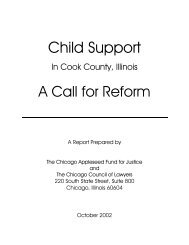Videoconferencing in Removal Hearings: A Case Study of the ...
Videoconferencing in Removal Hearings: A Case Study of the ...
Videoconferencing in Removal Hearings: A Case Study of the ...
Create successful ePaper yourself
Turn your PDF publications into a flip-book with our unique Google optimized e-Paper software.
• EOIR should issue regulations barr<strong>in</strong>g <strong>the</strong> use <strong>of</strong> videoconferenc<strong>in</strong>g <strong>in</strong> bond<br />
hear<strong>in</strong>gs, except by written consent <strong>of</strong> <strong>the</strong> immigrant. Although<br />
videoconferenc<strong>in</strong>g may <strong>in</strong>crease <strong>the</strong> speed with which bond is decided (and a<br />
speedy decision will <strong>of</strong>ten be <strong>of</strong> great benefit to immigrants), some bond hear<strong>in</strong>gs<br />
will require assess<strong>in</strong>g <strong>the</strong> credibility <strong>of</strong> <strong>the</strong> immigrant. In such cases, immigrants<br />
may prefer to be physically present before <strong>the</strong> judge, and <strong>the</strong>y should not be<br />
forced to accept videoconferenc<strong>in</strong>g.<br />
• F<strong>in</strong>ally, EOIR should bar <strong>the</strong> use <strong>of</strong> videoconferenc<strong>in</strong>g <strong>in</strong> <strong>the</strong> case <strong>of</strong> children,<br />
represented or not, a class <strong>of</strong> immigrants who are especially likely to be adversely<br />
affected by videoconferenc<strong>in</strong>g.<br />
4. Improv<strong>in</strong>g <strong>in</strong>terpretation<br />
Interpretation failures were endemic to videoconference hear<strong>in</strong>gs. Technological<br />
issues undoubtedly played a role (for <strong>in</strong>stance, telephone <strong>in</strong>terpreters may have been<br />
difficult for immigrants to understand), but <strong>the</strong> real problem was <strong>the</strong> culture <strong>of</strong> <strong>the</strong><br />
hear<strong>in</strong>gs <strong>the</strong>mselves. Many <strong>of</strong> <strong>the</strong> judges did not attach enough importance to<br />
<strong>in</strong>terpretation with<strong>in</strong> <strong>the</strong> court process and did not require (or allow) <strong>the</strong> <strong>in</strong>terpreter to<br />
<strong>in</strong>terpret much <strong>of</strong> what was said. When <strong>the</strong>re was <strong>in</strong>terpretation, it was uniformly<br />
consecutive ra<strong>the</strong>r than simultaneous (<strong>in</strong>terpretation that occurs as a speaker speaks).<br />
These <strong>in</strong>terpretation problems are probably not limited to videoconferenc<strong>in</strong>g cases, but<br />
<strong>the</strong>y may be exacerbated by videoconferenc<strong>in</strong>g, because videoconferenc<strong>in</strong>g <strong>in</strong>creases <strong>the</strong><br />
propensity <strong>of</strong> an <strong>in</strong>terpreter to serve <strong>the</strong> needs <strong>of</strong> <strong>the</strong> physically immediate judge (for<br />
whom <strong>in</strong>terpretation is an after-thought), ra<strong>the</strong>r than <strong>the</strong> remote immigrant. Moreover,<br />
before videoconferenc<strong>in</strong>g, <strong>the</strong> lack <strong>of</strong> full <strong>in</strong>-court <strong>in</strong>terpretation could be mitigated<br />
54




